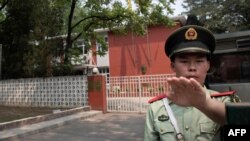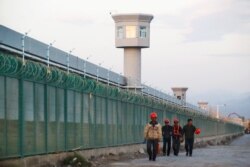A recent arrest of a Uighur mother and her four children by the Chinese police at the Belgian Embassy in Beijing highlights a growing pattern of persecution by Chinese authorities against members of the Muslim minority who have families living abroad, rights groups charge.
Horiyet Abla, 43, was arrested by Chinese police after she refused to leave the Belgian embassy where she was applying for a visa in hopes of reuniting with her husband who lives in Belgium as a refugee, according to her husband.
“The staff member who handled my wife’s case at the embassy told her that they would wait for at least three months for the visa to be issued and she should go home and wait,” Ablimit Tursun, Abla’s husband, told VOA.
When his wife asked embassy employees if she could meet with the ambassador, they told her he was away that day.
“My wife then said she would wait for the ambassador and refused to leave the building. The embassy’s security services dragged her and my children outside the building to the embassy’s yard where my family remained, unwilling to leave and asking for the embassy’s protection,” Tursun said in a phone interview.
Later that day the Chinese police were reportedly called to the embassy. Chinese policemen subsequently forced the family into their car and drove them to a local police station.
There are an estimated 13 million Uighurs and other Turkic Muslim minorities living in the Xinjiang region in northwest China. The Chinese government has faced growing criticism from the international community over the detention of Uighurs and other Muslims in so-called re-education camps.
Some rights groups allege that given China’s poor record in treating the Uighur community, it’s not surprising that interrogations, torture, incarceration in camps, and enforced disappearances are being used against the families of Uighurs residing abroad.
“China’s rights violating policies towards the Uighurs don’t stop at the borders of Xinjiang,” said Phil Robertson, the deputy director of Human Rights Watch’s Asia division. “Beijing is actively seeking to control Uighurs abroad and the easiest way to do so is to hold their families hostage to compel behavior China wants.”
Chinese officials do not release official statistics on people detained as part of their internment programs, but U.S. officials say the number could be closer to 3 million people.
Robertson blamed the Belgian Embassy staff for the recent arrest that took place inside the embassy.
“The Belgian Embassy official responsible for that phone call has blood on their hands,” he told VOA. “They certainly should have known what would happen if they called in the police, but it appears they simply didn’t care — and that is totally unacceptable.”
But Vanessa Frangville, a China Studies professor at the University Libre of Brussels, who focuses on Uighur activism in Europe, told VOA that it’s not clear who called the Chinese police.
“It is doubtful that this mistake is due to misunderstanding of the Uighur situation,” she told VOA. “The Belgian government is very well informed and has taken dozens of Uighur refugees in Belgium since the early 2010s. The Uighur crisis is well known and well informed,” she added.
Diplomat’s visit to Xinjiang
This week, Belgium’s Belga news agency reported that Belgian Foreign Minister Didier Reynders said “a Belgian diplomat will leave Tuesday to the Chinese province of Xinjiang to ascertain the situation of the Uighur family who was present at the embassy in Beijing on May 28.”
He added the Belgian ambassador will also meet the director of Chinese Consular Affairs so that the family can receive the passports that will allow them to leave China.
Reynders also told Le Soir newspaper that the diplomatic police “asked the family to leave the premises” and the situation was explained to the father the next day. An embassy is not intended to “lodge people” applying for visas, he said.
According to Tursun, his family has been sent back by the Chinese police to Xinjiang where they are living under constant fear of being detained again. It is unclear when the family will be able to leave China after receiving their Belgian visas.
China’s response
Chinese Foreign Ministry Spokesperson Lu Kang responded when asked about the case.
“Many journalists have asked about individual cases relating to Xinjiang at our press conferences. However, after we invested a lot of time and efforts to obtain more information and offered responsible feedback, those same journalists failed to give it open and accurate coverage. Frankly speaking, that is not fair,” he said during a press conference this week.
“That's why I would like to reiterate here that if you promise to cover our feedback in an open and accurate manner, we will try to get more information from relevant departments for you,” Kang added.
Similar cases
While Tursun’s case has drawn attention in Western press, similar cases have occurred in the past.
Kamaltürk Yalqun, an exiled Uighur who lives with his mother and sister in Philadelphia, said that his father, Yalqun Rozi was arrested in late 2016 just before his planned trip to the U.S. to reunite with his family.
Not knowing his father’s whereabouts, Yalqun chose to remain silent about the sudden disappearance.
Chinese officials later confirmed that his father had been imprisoned for “inciting subversion of state power,” and was sentenced to 15 years in prison.
“My father edited Uighur books, published articles about Uighur culture, and helped develop the Uighur curriculum for schools. He did his job under Chinese law and became a criminal at the end,” he said.


